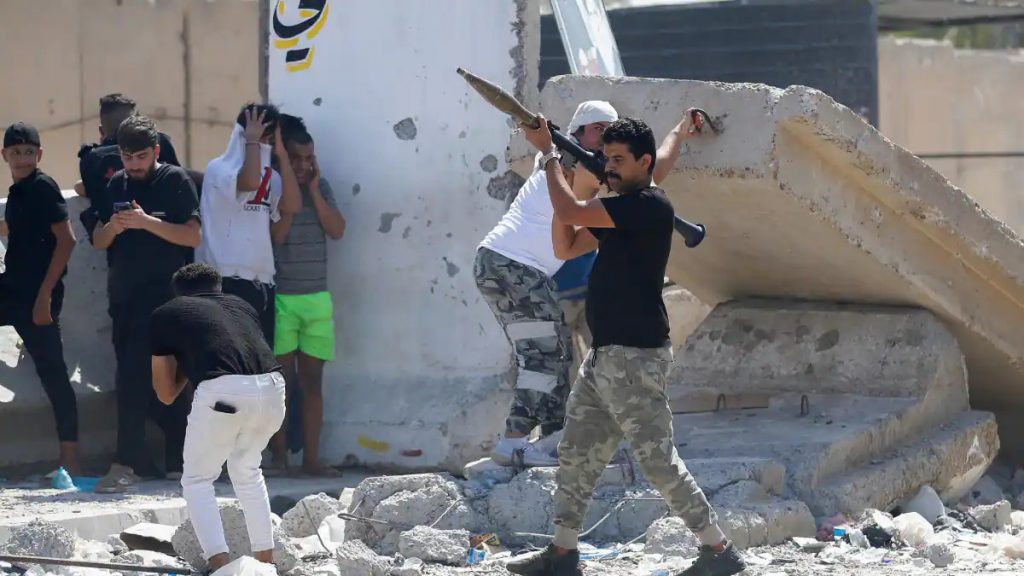NewsGate Press Network
Many had predicted this on the streets of Bagdhad for quite sometime now.
Popular leader Muqtada al-Sadar, a Shia cleric had his loyal militia group, the Peace Brigades, pitted against the state’s machinery.
The result has been a bloody affair – 30 dead in the past 24hrs and many reported to have suffered gun-shot wounds in the worst kind of violence that had struck the Iraq’s capital city.
The Iraqi capital remained “extremely tense” on Tuesday after a night of armed clashes between Iraqi security forces and supporters of a powerful Shia cleric that left some 30 people dead and several hundred wounded.
The Monday violence was sparked after Muqtada al-Sadr announced his permanent retirement from politics.
al-Sadr has launched a hunger strike until “violence and the use of weapons” ends.
“We have been hearing sounds of gunfire overnight, medium and light weapons have been used, we heard also several explosions inside the Green Zone,” Al Jazeera reported, quoting one of its journalists.
The Iraqi News Agency quoted security forces as saying that the Green Zone, which houses government buildings and embassies, was targeted with four missiles.
The missiles landed in a residential complex, causing damages.
“The missiles was launched from the areas of Al-Habibiya and Al-Baladiyat, east of the capital, Baghdad,” the statement added.
The residents of Baghdad woke up to the sounds of intermittent gunfire and explosions.
Iraqi security forces forced out Shia cleric Muqtada al-Sadr supporters from the Republican Palace, where the Prime Minister’s office is located, as well as the surrounding areas, media reports said.
A source also told Al Jazeera Arabic that negotiations were taking place between government officials as well as leaders from the Sadrists and their opponents, the Coordination Framework alliance.
“The situation is very tense… There have been calls for the Grand Marji’a, the Grand Shia religious reference in Najaf city, to intervene to put an end to this conflict,” the report said.
al-Sadr’s fasting move came after deadly violence erupted in Baghdad amid protests by al-Sadr’s followers. At least 30 people have been killed and hundreds more wounded, according to a medical source.
Iraq’s caretaker prime minister has appealed for calm and the military has declared a nationwide curfew after unrest in several other cities, the BBC said.
Street fighting erupted on Monday as gunfires were exchanged and tracer rounds illuminated the night sky in what is being called the worst violence to hit the Iraqi capital in recent years.
Much of the fighting was concentrated around the city’s Green Zone, an area that houses government buildings and foreign embassies, the BBC added.
Security officials said some of the violence was between the Peace Brigades, a militia loyal to al-Sadr, and members of the Iraqi military.
Videos shared on social media appeared to show some fighters using heavy weaponry, including rocket-propelled grenades (RPGs).
Iran has closed its borers with Iraq, and Kuwait has urged its citizens to leave the country immediately.
BBC quoted an international agency reporting that medics claimed 15 supporters of al-Sadr were shot dead and about 350 other protesters injured.
A spokesperson for UN Secretary General Antonio Guterres said he was alarmed by events and called for “immediate steps to de-escalate the situation”.
Interim Prime Minister Mustafa al-Kadhimi, an ally of al-Sadr, has suspended cabinet meetings and has pleaded with the influential cleric to intervene and stop the violence.
A senior al-Sadr aide told Iraq’s state news agency INA that he had announced a hunger strike until the violence and use of weapons stopped.
The violence sparked a day after al-Sadr’s announcement that he was withdrawing from political life — a move he blamed on the refusal of rival Shia leaders and parties to reform the Iraqi political system.
In October, candidates loyal to al-Sadr won the most seats in Iraq’s parliament, but he failed to secure enough seats to form a government. He has since refused to negotiate with Iranian-backed Shia groups, sparking almost a year of political instability.
al-Sadr has said in a statement: “I had decided not to interfere in political affairs, but I now announce my final retirement and the closure of all (Sadrist) institutions.” Some religious sites linked to his movement will remain open.
al-Sadr, 48, has been a dominant figure in Iraqi public and political life for the past two decades. His Mehdi Army emerged as one of the most powerful militias which fought US and allied Iraqi government forces in the aftermath of the invasion which toppled former ruler Saddam Hussein.
He later rebranded it as the Peace Brigades, and it remains one of the biggest militias which now form part of the Iraqi armed forces.


Comments are closed for this post.